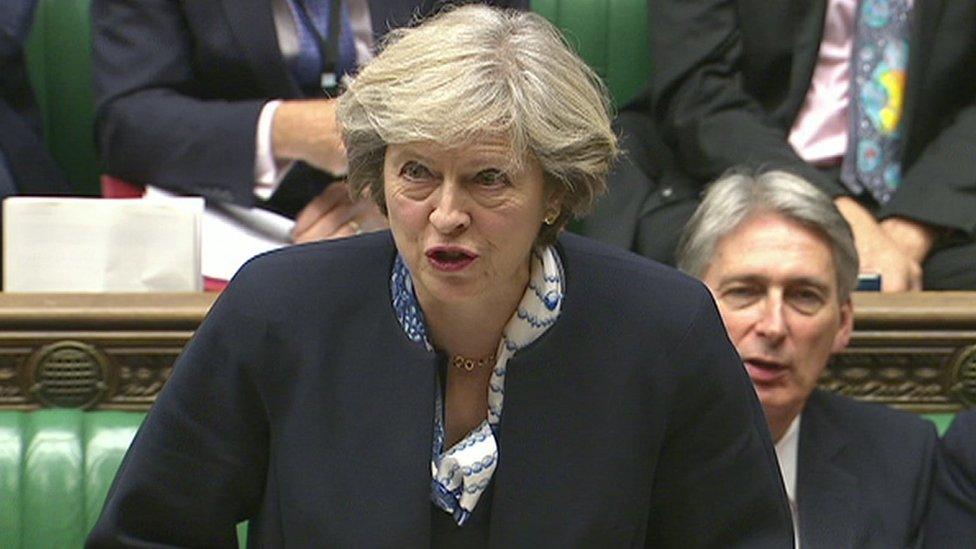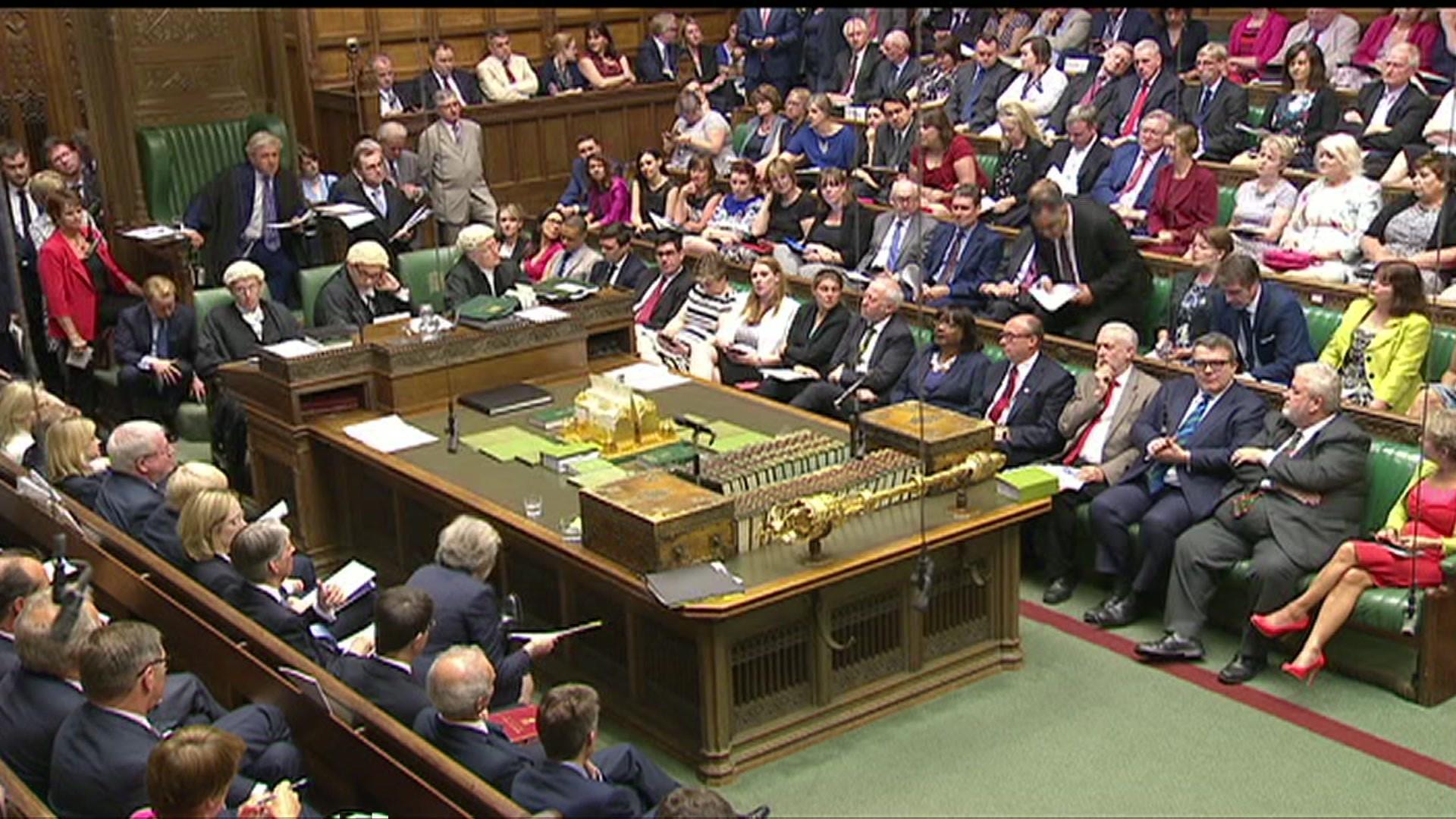Theresa May dismisses Jeremy Corbyn's Brexit 'shambles' claim
- Published
The Labour leader asks the prime minister about the UK's future relations with the EU.
Theresa May has rejected a claim by Labour leader Jeremy Corbyn that she is overseeing a "shambolic Tory Brexit".
During Prime Minister's Questions she said she wanted "maximum possible access" for the UK to the single market after leaving the European Union.
Mr Corbyn said the government had "no answers", but Mrs May promised to be "ambitious" in Brexit negotiations and to exert greater migration control.
But several senior Tories demanded more clarity about the UK's aims.
During a debate on a Labour motion about Parliament's role in Brexit policy, former business minister Anna Soubry said MPs must consent to the process of the UK's separation from the EU while Clare Perry said confusion about the UK's future access to the EU single market was having an alarming impact on the pound.
"The problem is that many people in the country don't think that there is a policy to put the national interest first, they think there is a policy to put people's narrow ideological interests first," she said.

Analysis by Laura Kuenssberg, BBC political editor
Frankly, we know almost as little about the plan for Brexit that's concrete as we did that momentous morning after the referendum itself.
But there have been plenty of hints, implications and suggestions of priorities that are worth noting, even if just to reveal how much that we can't be sure of.
It is not by any stretch an exhaustive list, and without concrete proposals, everything is still open to interpretation.

In response, Brexit Secretary David Davis conceded there must be proper scrutiny of the UK's blueprint for leaving the EU but "it is not one where we will allow anyone to veto the decision of the British people" set out in June's referendum.
The subject of Brexit dominated the first Prime Minister's Questions since the end of the party conference season, with Mr Corbyn asking: "Is the prime minister really willing to risk a shambolic Tory Brexit just to appease the people behind her (Conservative backbench MPs)?"
Mrs May replied: "We will negotiate the right deal for the UK. That's what matters to everyone in the UK and that's what we will deliver."

Mrs May is under pressure to give MPs a vote on the UK's negotiating aims
She told MPs any deal would aim for "maximum possible access to the single market", but added she was "absolutely clear that the British people" wanted "maximum control" over immigration.
The Labour leader accused the government of having "no answers" and said it should stop "running away from the looming threat" to jobs and living standards.
Ministers are facing calls to set out details on what they want Brexit to look like before triggering Article 50 of the Lisbon Treaty - the two-year process of working out the terms of the UK leaving the EU.
'Respect for vote'
Labour is calling for "proper scrutiny" by Parliament of discussions ahead of the government starting negotiations with the EU.
Ahead of the Brexit debate Labour set out 170 questions, external for the government, including on trading relationships and migration rules.
The Labour leader reminded Theresa May of a former chancellor's comments on sterling
Some senior politicians - including former Labour leader Ed Miliband - are demanding a full vote on the UK's negotiating stance ahead of full discussions with the EU beginning.
But the government says it does not want to have its hands tied before talks, and some argue a vote could be used as a way of undermining the result of June's referendum, in which voters chose by 52% to 48% to leave the EU.
'Full and transparent'
Labour's Commons motion fell short of specifically asking for a full vote on the UK's Brexit negotiating stance. Instead, it asks for a "full and transparent" debate on the plan for leaving the organisation and for Prime Minister Theresa May "to ensure that this House is able properly to scrutinise that plan... before Article 50 is invoked".
The government has tabled an amendment to the motion - which Labour has accepted - stating that negotiations for Brexit must be handled in a way that "respects the decision" reached in the referendum.
Labour's decision to agree to the government amendment means there was not a vote at the end of Wednesday's debate.
Opening the debate on Labour's motion, shadow Brexit secretary Sir Keir Starmer said the terms under which Brexit could happen were "not on the ballot paper" for the referendum.
He added: "Nor did the prime minister set out her terms for Brexit before assuming office."
Former Conservative ministers Ken Clarke and Dominic Grieve suggested MPs should get a vote on the Brexit blueprint, which Sir Keir agreed with.
But Brexit Secretary Mr Davis said: "We have been pretty clear on the overarching aims, not the detailed aims. We're not even at the point that that's possible.
"The overarching aims are these: bringing back control of laws to parliament, bringing back control over decisions of immigration to the UK, maintaining the strong security cooperation that we have with the European Union and establishing the freest possible market in goods and services with the European Union and the rest of the world."
Liberal Democrat former deputy prime minister Nick Clegg said that, with "fancy diplomatic footwork and some political intelligence", it was possible to negotiate continued access to the single market while curtailing freedom of movement.
Conservative former minister John Redwood, a prominent Leave supporter, said: "I'm very optimistic about our European partners. I think they will want tariff-free trade. I don't hear Germany and France queuing up to impose tariffs on us."
- Published13 October 2016

- Published12 October 2016
